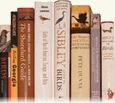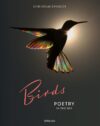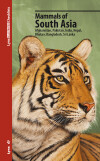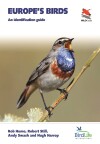Interview with Pete Dunne
October 17, 2008 | Comments (0)Author extraordinaire Pete Dunne was the keynote speaker at this year’s Colonial Coast Birding and Nature Festival, held annually on Jekyll Island, Georgia. It was a blast to hear him speak, and even more so to bird with him. It is with complete honesty that I say that if I could write (or bird) like anyone, it would be Pete Dunne. Thus, it was an honor (and a bit intimidating!) to be able to sit down and ask him a couple of questions.
Your next book, Prairie Spring, will be published next year. Can you tell us a little about it?
It’s part of a four-part series. The focus is not the season, the season is just a carriage. The focus is actually the overlap of humans and the natural world. The season is a common ground that most people can relate to.
You’ve written about your beginnings as a birder. But how did you become a writer?
It began just about the same time. I think I started to write my first book about birds when I was in the second grade. The name of the book was Turk: The Story of a Hawk. I stopped it when I realized on page one that I was actually plagiarizing the story called Rufous Redtail, which is also a wonderful book.
Do you ever want to write about something other than birds? Perhaps a novel?
I wish I had a novel in me. If I do, it’s deeply hidden. I’d love to write a novel, I think it would be incredible fun to be able to just weave a story out of air. But I actually write a great deal about things that are not birds; I write a great deal about people. I think one of the things I try to do with my writing is to write about the junction of people and the natural world. So this book series that I’ve started is just a continuation of something that I’ve been doing for a long time.
Many of your columns are obviously fictional. But there are some that have left me wondering whether they really happened or not. What percentage of the situations you’ve written about happened as you wrote them?
I’d say that very few of them happened exactly that way. The great thing about writing fictional accounts, even if they have foundation in fact, is that you can embellish.
There’s one in particular that I have to ask about – did some random birder at Cape May really want to find a Semi-palmated Plover for you? (as told in More Tales of a Low-Rent Birder)
Yes, that really did happen. He was a very nice guy.
Many times, you write from the bird’s perspective, such as in The Wind Masters. How do you do that so well?
I don’t know. I’d love to tell you that writing is hard, but it’s not. If you have a good idea, it writes itself. If you have a bad idea, two days later you have 3500 words on paper and you still have a bad idea.
Any chance for more books like Wind Masters, but with other groups of birds?
There’s actually elements of that in the series I’m doing right now. For instance, in Prairie Spring I have a conversation with a painted horse.
It seems to me that a proportionally high number of top-notch birders are also exceptional writers. There’s yourself, Kenn Kaufman, and Scott Weidensaul, just to name a few. Does it seem that way to you as well?
I think that maybe we’re simply the ones that because we’re accomplished communicators, that we’re known. I’m sure that there are very, very skilled birders out there on par with Kenn and David (Sibley) who might not be well known. But they’re still very good birders. I think in every endeavor communication is fundamental, no matter what you do.
Before your Field Guide Companion, it would have been hard to imagine an identification guide with absolutely no illustrations. How was your concept of it initially received?
I think the concept was very warmly received. Houghton-Mifflin (the publisher) is a wonderful house, and Lisa White (the editor) is a great person to work with. But I think the bloom was off the rose when I turned in my manuscript and it was four times longer than anticipated! They published it very much as it was written, but the original concept was for a much shorter book. It was a tale that grew in the telling.
Anything else in the works that you can talk about?
A couple collections of essays. And I’m never short of ideas, there’s a whole wall of books that I would love to write someday. I will never finish a project where I won’t have five or six other ideas vying for my attention.
Many thanks to Pete for being gracious enough to consent to this interview even when he wasn’t feeling well, and for enduring it even though I am without a doubt the worst interviewer that he has ever had to suffer through. I wish him luck in writing that wall of books that he wants to write, because I want to read them even more.







